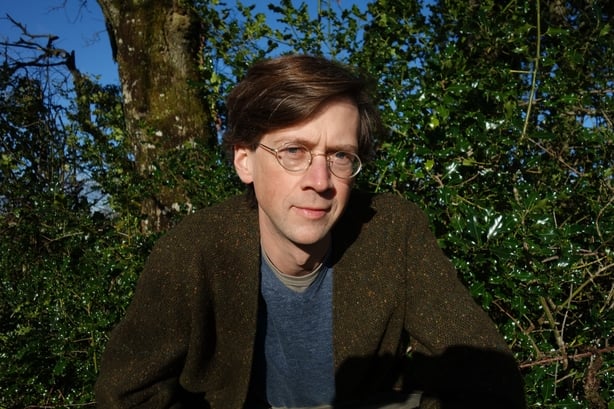When travel journalist Manchán Magan decided to stop travelling by plane, he says he didn't realise how much it would affect his career.
"Had you asked me even a few years ago, I would never have thought that I was going to stop flying. It just wasn't something that got in my head."
He made the change in 2019, when Greta Thurnberg's impassioned activism against climate change, new reports from the UN on how close we were to climate disaster, and air travel's role in that, and Extinction Rebellion's global protests against carbon emissions prompted him to rethink how he travelled, and the example he was setting in doing so.
"I thought, I can't continue this. In the knowledge that, let's say, 20 years in the future, I'd look back and think, my God, I had knowingly continued to promote flying at a time where I knew the damage it was doing", he says.
As a roving travel journalist, who began his career criss-crossing the globe with his brother making documentaries in far-flung locations like India, he'd seen up close how casual plane travel had become - and destructive.
"We got to the point where we were just flying every weekend, almost", he says, reflecting on those years before the Covid-19 pandemic when cheap flights were seemingly on offer every day. However, the realisation that he was contributing to it hit him, excuse the pun, like a train.
From that point on, he decided that he would only travel to promote his work and books about the Irish language and culture, but all other journeys would be by train or ferry.
Now, five years later, Magan is bringing his appreciation for the romance and spontaneity of train travel to our screens, with his new series Manchán's Europe By Train, which starts Sunday 18 August.
'Manchán's Europe By Train' a new 4 part travel series starts Sunday on @RTEOne at 6.30pm🌍🚉
— Tyrone Productions (@tyronetv_irl) August 14, 2024
Join @ManchanMagan as he kicks planes to the curb & embraces the joys of slow travel, embarking on an epic month long environmentally-friendly train journey across Europe #ManchansEurope pic.twitter.com/jxqZNe1FKx
The route will see him snake across the continent from Wales, London, Brussels, Rotterdam, Amsterdam, Berlin, Prague, Budapest, Zagreb, Lake Bled, and onwards to Genoa, Monaco, Toulouse and San Sebastien.
Of course, train and ferry had been the predominant forms of travel for many generations of intrepid explorers and overworked holiday makers, so Magan's show is very much a return to his own roots.
His first ever trip at 19 saw him travel through London to France, Spain, through the Sahara Desert, to Togo, Benin, and all the way down to Kenya. On such journeys, and later filming his documentaries, he would consult guidebooks (if even) and figure out his way as he went.
"A good guidebook made sure it was going to find hidden places and hiddin niches that you weren't going to find other people. That's not what Instagram wants to do or social media. It wants to funnel everyone to the exact same place, and you tick that off."
Of course, short flights away can be enriching too and offer "a jolt of excitement", Magan says. "But there's something really reassuring about doing this type of slowing travel that feels nourishing and wholesome and nurturing."
Spontaneity and freedom were two elements that Magan wanted to get across, bewitched as he is with the romance of charting a route on your map and having the availability to hop off somewhere else if the mood strikes you or if a placename sounds interesting.
"It led to some of the more dramatic and exciting bits on the trip", he says. "That freedom is there, and it is definitely not there in a plane. You are on a schedule, a scheduled routine route, and you can't really make any journeys. And if you do make any journeys, any off-the-cuff journeys or stops, they're going to be incredibly expensive. They're going to put your whole trip awry."

That said, Magan wanted to show it in "a pragmatic way" too, examining the expenses and obstacles that come with train travel, and including "an objective calculation in terms of what are the emissions emitted by ferry and train compared to flights".
Magan carries his regret at travelling so much by plane so far in his life, and is keenly aware of how "hypocritical" it would be for him to tell someone not to travel. For those of us who want to see the world and learn from it as he has, what is his advice?
"I think the idea is that we just do more conscious travel. We decide, when do we do it? Is it worth doing a journey every two years and make it a big journey and spend longer there?"
He's also in favour of "love miles", the idea that one "will only travel if there's someone on the other side that you deeply love and is going to make your life so meaningful".
When it comes to cost of alternative travel, he says, "there's really no way of getting around that. That requires government intervention. There's no reason why ferry and train should be more expensive. It certainly wasn't the case when I was young".
However, he is certain that there are ways that "we can offset that".
"Because we are going to grow in ourselves, we are going to become enriched, we're going to use that experience for benefit."
Manchán's Europe By Train starts Sunday 18 August at 6:30pm on RTÉ One.


